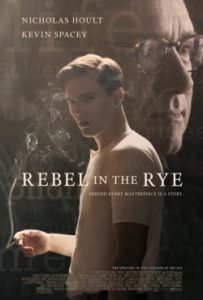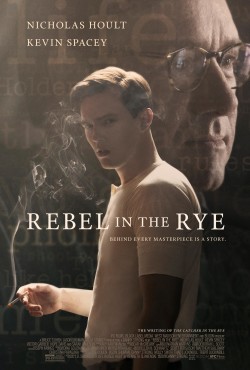 I vaguely recall reading “The Catcher in the Rye” in High School. But I must not have been overly impressed with teen-angst icon Holden Caulfield because unlike characters in, say, “To Kill a Mockingbird” or “Lord of the Flies,” Holden and his story failed to stick with me into my adult years. Perhaps that’s because the 1951 novel (that’s sold more than 65 million copies) was never adapted for film! At least now I understand why, thanks to the mildly intriguing biographical drama, Rebel in the Rye, about famously reclusive author J.D. Salinger who steadfastly refused to sell theatrical rights to his most famous work.
I vaguely recall reading “The Catcher in the Rye” in High School. But I must not have been overly impressed with teen-angst icon Holden Caulfield because unlike characters in, say, “To Kill a Mockingbird” or “Lord of the Flies,” Holden and his story failed to stick with me into my adult years. Perhaps that’s because the 1951 novel (that’s sold more than 65 million copies) was never adapted for film! At least now I understand why, thanks to the mildly intriguing biographical drama, Rebel in the Rye, about famously reclusive author J.D. Salinger who steadfastly refused to sell theatrical rights to his most famous work.
Rebel in the Rye follows (or imagines, as best it can) the experiences and people that influenced Salinger’s life as he struggled to bring the semi-autobiographical Holden Caulfield to life, first in short stories, and later in a full-fledged novel. Those people include: a supportive mother Miriam (Hope Davis); a not-so supportive father Sol (Victor Garber); an ex-girlfriend Oona O’Neill (Zoey Deutch) who jilted him (and married Charlie Chaplin) while Salinger was away at war; teacher/mentor and sometimes friend Whitt Burnett (Kevin Spacey); and literary agent Dorothy Olding (Sarah Paulson). Not a bad supporting cast for young British actor Nicholas Hoult (X-Men, Equals) who plays Jerry, aka “J.D.”
Because Salinger remained reclusive until his death in 2010 (at the age of 91), writer/director Danny Strong could only guess how certain scenarios played out in the mind of Salinger both before and after his service in World War Two, which triggered bouts of what would today be diagnosed as PTSD. The film (based on the biography “J.D. Salinger: A Life” by Kenneth Slawenski) explores themes ranging from alienation, creative control, and literary passion to spiritual awakening, seclusion, mental illness and family dynamics. Some elements work better than others in the film, though I must admit — I’m more than a little tempted to go to the library and (re)check-out “The Catcher in the Rye” to give Holden a second chance. Not that Salinger himself would care. If I don’t ‘get’ Holden, that’s my problem. Salinger’s loyalty was always to the Holden that he worked so compulsively – and stubbornly- to create. At least, that’s what I took away from this particular biopic.
Bottom line: Rebel in the Rye is a so-so indie that will appeal most to literary-minded folks who are interested in what makes writers tick and/or fans of Holden Caulfield and “The Catcher in the Rye.”

